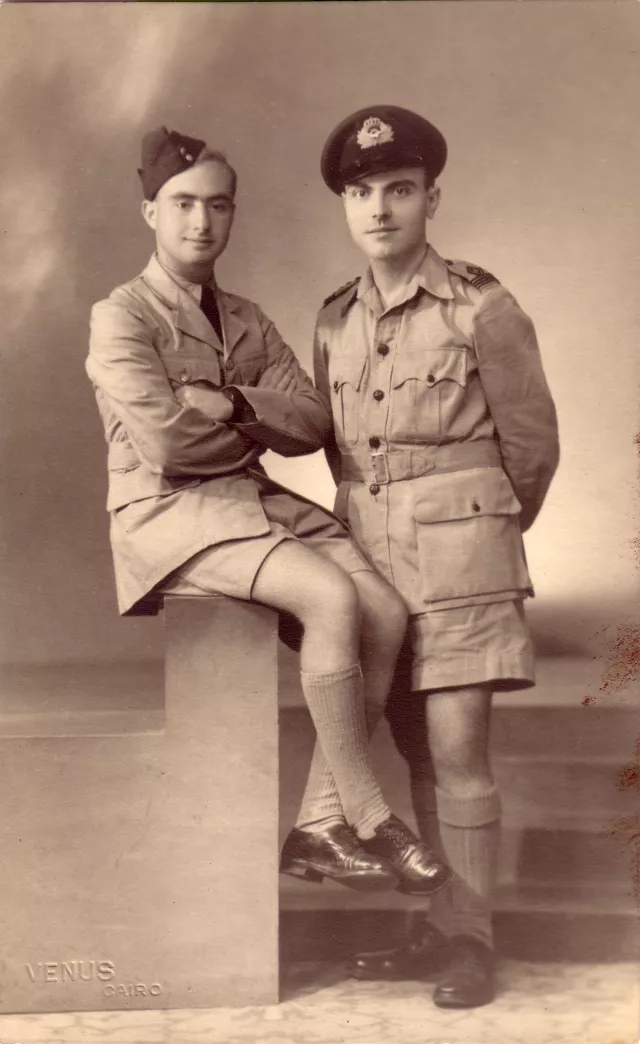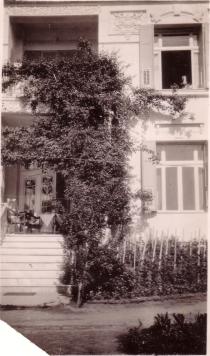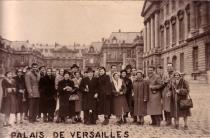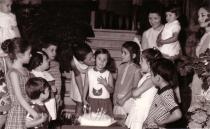This is a picture of myself and Antonis Papahrisanthou during my military service in Egypt.
After escaping from Thessaloniki, I stayed in Athens from the Easter of 1943 onwards. It must have been around May or April.
A month later Antonis already started to tell us that there will be a team of officers who wanted to leave for Cairo. Antonis was second lieutenant. Not on active service, but at the logistics corps.
They had hired him to keep their books of the Military Pension Fund (MPF) of the Air Force, because he was a graduate of the Business School.
Many officers were coming to get paid at the MPF, and they started stirring things up, since they knew that the rest of their colleagues had gone to Cairo and were all promoted to higher ranks.
So they were saying, we should not be left behind. It was a team of about 20 officers from the air force, 10 from the navy and 2-3 from the infantry. And they had bought a boat.
We would go to a beach in Euboea, which is the closest mainland place to Turkey and the boat would come and take us.
Antonis had told us to go with him. He didn’t have any money. We financed him, but the two of us did not go together. I went alone, because we thought that I should go first and if it worked, Danny would follow the same path.
We gave 30 sovereigns, I think. That was a lot of money at the time. With two gold sovereigns you could feed a family for a month.
The way the system worked was that you would buy the boat and it would come and pick you up and it would get you through, but after that the boat would stay with the captain. At every journey the captain, would get a new boat.
We passed from the mainland to Euboea, and all night we walked through it until we got to the other side. The small port where they would come to pick us up was called Akeoi.
I don't know why, we waited there for about 15 days. The boat didn’t come to pick us up. I remember when we were staying there for fifteen days, I used to wash my clothes in sea water.
We didn't have much water or soap or anything like that. At that very same port the boat that was regularly doing the transport between Greece and Cairo came by. It was one of the Greek secret agency.
The 2nd office of the Greek government at Cairo owned it. They had it as a liaison. For us, this was very good, because this ship was very fast, it had really good engines and it was armed.
I remember it was the 15th of August when we got on the ship. It was Virgin Mary’s holiday, on the 15th of August 1943.
They put us on the boat and they put us down to the hold. We weren’t on the deck because airplanes were going by. And they had put up the Turkish flag. Thankfully, that night there was a great tempest. In the boat, it wasn’t just our team.
There were many other villagers who were leaving. As an adventure, to go and fight. The villagers that came with us knew nothing about the sea. And they started throwing up.
At four in the morning we arrived at a beach at Tsesme at the other side of the Aegean, in Turkey. The captain left us and the Turks collected us. First, they took from us whatever we had. They mainly wanted watches, fountain pens, and matches.
Matches or lighters were not allowed at that time in Turkey. After they had taken everything, they said, “we will give you in, in Mitilini”. “We will take you to Mitilini and give you in to the port authority, to the Germans there”. One of us would then say “no, take this”.
We were offering our things to them on our own. After they had made sure they hadn’t left us with anything else, they said, “let’s go to the Greek consulate”.
They brought busses and took us to Tsesme, the city, and they shut us inside an inn. That’s where they would put us until our papers were prepared so that we could pass through the control. Later on, they came from the consulate at Izmir and took us.
In Izmir, once more they put us inside an inn from which many had passed by before. The control was done there after which they put us on the trains. We were finally at the hands of the Greeks, of the Allies.
We had to get on the train to go to Aleppo. Aleppo is in Syria, the nearest place to the Turkish borders. At Aleppo they also interned us for two reasons, one to pass the control for spies and two to check whether we had any diseases.
We were on quarantine.We stayed there for 3 or 4 days. We had a lot of food there. Everyone jumped on the food there. And because we ate out of gluttony we spent all three days sick.
I was fortunate that the one who questioned me was an Englishman from Thessaloniki. He was called Donaldson. He had a shop with fine liquor and food etc. It was like a grocery shop, but with luxury goods. Black caviar, fish roe, and champagne. Donaldson knew my father. So, when he heard my name,... .
Then we had to go through the recruitment office. Since I was together with all the people from the air force, who were from group captains to pilot officers, they told me that “you will come with us to the air force”. And for as long as I served in the army I was everyone's favorite kid. From there they told us that we would go to Gaza. There were army camps there for all the Greek who had to do their first training, the infantry training there. There were land army officers there to train us.
In the Middle East I started finding myself again. I felt free. I felt like a human being again. I had some value that I could perhaps use. Because, I have to say, that everything came easy to me.
I had no problems with my colleagues, the trainers, or the instructors. I was getting along very well with others. Especially in the Air Force, I was under the protection of those that we had left together. No protection was actually needed, it was enough that they knew.
In Gaza we stayed for as long as it was needed to finish our training, that is for four months.
When we were done with all this, they started asking us who wanted to go as a volunteer to fly, to go to the air force. I was the first one who went to register.
But to do so, you had to go to Helioupolis, a place at the outskirts of Cairo. This is where the medical offices of the English were. There they would put you through a very thorough health check especially on the eyes.
They would reject two out of three people, because of their eye sight. But until it was our turn, we had to wait for around 15-20 days in Cairo. They had put us in a unit there. We would go from Cairo to Helioupolis by train.
Cairo was international at the time. And one could see there Greeks, many Cypriots, Yugoslavians, Polish, Canadians, people from all around the world. There were many from New Zealand and Australia.
There was a Greek woman that all the officers used to go to. Papachrysanthou, my friend, had taken me too. She was a very nice girl. She served all the officers.
At that time in the barracks, but also when we went out, we didn't have any girl company of the same age that we could go out and entertain ourselves.
Thankfully, I passed my exams and I was judged suitable. They told me, "now you will wait for your turn to be sent to Rhodesia".

















































